 Image search results - "tottori" Image search results - "tottori" |

Shoji Ueda Museum of Photography. Beautiful museum in the middle of nowhere, dedicated to the late Ueda Shoji, one of Japan's most famous fine-art photographers.
|
|
|
|

Entrance
|
|

Front view. On the left, there is a small lens in the wall for a camera obscura.
|
|
|

Inside one of the galleries.
|
|

View of Mt. Daisen.
|
|
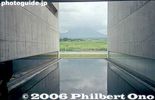
View of Mt. Daisen.
|
|
|
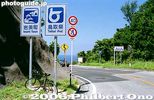
Now entering Iwami-cho town from Fukui.
|
|
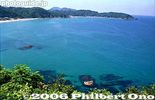
Uradome Coast, Tottori, part of the San-in Coast National Park. 山陰海岸国立公園
|
|

Perfect for snorkeling, Uradome Coast, Tottori
|
|
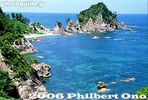
Uradome Coast, Tottori, part of the San-in Coast National Park. 山陰海岸国立公園
|
|
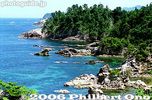
Uradome Coast, Tottori
|
|
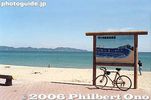
Yumigahama beach, Yonago, Tottori Pref.
|
|
|
|

Mt. Daisen in winter as seen from the train. Tottori Prefecture.
|
|

Mt. Daisen in winter as seen from the train. Tottori Prefecture.
|
|

Mt. Daisen in winter as seen from the train. Tottori Prefecture.
|
|
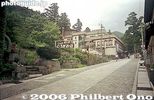
Slope on Mt. Daisen.
|
|
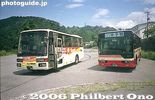
Bus stop on Daisen.
|
|
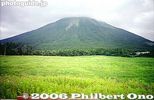
Mt. Daisen, Tottori Pref.
|
|

Hawai Onsen hot spring is on the western shore of Lake Togo, a small brackish lake in Yurihama town in central Tottori Prefecture. A 15-min. bus ride from JR Kurayoshi Station at this bus stop.
|
|

Lake Togo is a small brackish lake connected to the Sea of Japan through a 2 km river. The perimeter is 12 km, and there's a walking path. There are no swimming beaches.It is a rare lake in Japan to have hot spring water gushing out of the center of the lake. The warm water creates a misty lake surface in winter.
|
|

The lake has Togo Onsen on the south shore, while the smaller Hawai Onsen is on the western shore. The lake has been in its current shape since at least the 13th century.
|
|

Directional sign seen from the bus to Hawai Onsen.
|
|

Hawai Onsen bus stop has this foot bath.
|
|

Hawai Onsen was built on reclaimed land jutting over the lake where the natural hot spring water gushed out of the lake bottom. This reclaimed land now has a number of inns where guests can enjoy the hot spring water. Since "Hawai" sounds the same as "Hawaii", it has associated itself with Hawaii by holding a hula festival in July.
|
|

Near Hawai Onsen is a nice lakeside park.
|
|
|
|

Lake Togo on an overcast, winter day.
|
|

Walking path around Lake Togo.
|
|

Manhole for Yurihama town, Tottori Prefecture. Famous for Hawai Onsen, Togo Onsen, and Lake Togo.
|
|

This lakefront space is used for the Hawaiian festival held in July.
|
|

At the tip of the Hawai Onsen's reclaimed land jutting into the lake is an inn named Sennentei, one of the major inns.
|
|

Hawai Onsen got its start in 1843 when local fishermen noticed warm spring water gushing out the lake bottom. The local Tottori lord gave them permission to utilize the hot spring water to make it easier to boil water, etc.
|
|

In 1866, a former samurai stuck bamboo pipes into the lake bottom and was able to extract the hot spring water into a barrel on a boat above. It was an open-air spring bath on the rocking boat. This continued for some years until they finally reclaimed some land offshore in 1886 and drew the hot spring water directly below and even built a ryokan inn above. This was the start of commercial operations as "Asozu Onsen" (浅津温泉).
|
|

Bridge to Sennentei. I decided to bathe in their outdoor bath. Most of the inns have baths for visitors costing up to ¥1,000. 千年亭
|
|

Sennentei had a nice New Year's decoration with kadomatsu and tanuki. 千年亭
|
|

Sennentei had a nice New Year's decoration with kadomatsu and tanuki. 千年亭
|
|

Inside, Sennentei had a nice flower arrangement.
|
|

Sennentei lobby.
|
|
|
|
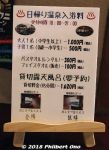
Bathing fees for non-staying guests. ¥1,000 for adults. Towels for rent too.
|
|
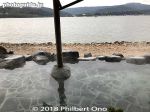
Men's outdoor bath at Sennentei. (Segregated) Hawai Onsen, Tottori. 千年亭
|
|
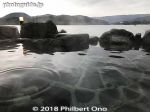
Men's outdoor bath at Sennentei. Nice view of the lake. Hawai Onsen, Tottori. 千年亭
|
|

Gift shop at Sennentei.
|
|

Gift shop at Sennentei sells Hawaiian chocolate.
|
|

Another large inn at Hawai Onsen is Bokoro. 望湖楼
|
|

This onsen had several name changes. In 1927, "Asozu Onsen" was renamed "Shin-Togo Onsen" (新東郷温泉). In 1978, it was renamed "Hawai Onsen" (羽合温泉). In 1998, they changed the Japanese name to はわい温泉 replacing the "hawai" kanji with hiragana.
|
|

Gift shop near the bus stop back to Kurayoshi Station.
|
|

Inside the Gift shop.
|
|

Autographed daruma.
|
|

Local souvenirs.
|
|

Yurihama poster
|
|

"Hawai" branch of this shop.
|
|

Map of the Hawai-cho area.
|
|
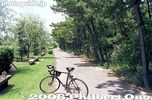
Hawai Rinkai Koen Beach Park in northern Lake Togo when I once cycled here. 羽合臨海公園
|
|
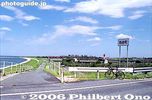
Border of Hawai-cho (now part of Yurihama city).
|
|
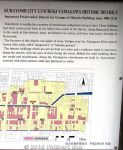
Kurayoshi's Shirakabe White-Wall Warehouses are in a National Important Traditional Townscape Preservation District (重要伝統的建造物群保存地区) named Utsubuki-Tamagawa (打吹玉川).This used to be a castle town until 1615. It was a commercial district up to the 1920s. About 100 traditional buildings with white walls (kura storehouses) and red roof tiles remain. The Tottori earthquake in Oct. 2016 damaged a few white walls. A short bus ride from JR Kurayoshi Station.
|
|

Map of Shirakabe Warehouse district in Kurayoshi. The district is compact, easy to walk around.
|
|

Road where I got off the bus.
|
|
|
|
|

The main kura storehouses here. 赤瓦二号館
|
|

The main Shirakabe kura storehouses in Kurayoshi, Tottori. 赤瓦二号館
|
|

The main Shirakabe kura storehouse in Kurayoshi, Tottori. 赤瓦二号館
|
|

The main Shirakabe kura warehouse in Kurayoshi, Tottori. 赤瓦二号館
|
|

The main Shirakabe kura warehouse in Kurayoshi, Tottori. 赤瓦二号館
|
|

The main Shirakabe kura warehouse in Kurayoshi, Tottori. 赤瓦二号館
|
|
|
|
|
|
|
|
|
|
|

Mt. Utsubuki where there was a castle until 1615. 打吹山
|
|
|
|
|
|
|
|
|
|

Tamagawa River
|
|

Tamagawa River 玉川と研屋町の町並み
|
|
|
|
|
|
|

This street corner had a large monument for Yokozuna Kotozakura, a sumo wrestler from Kurayoshi.
|
|

Kotozakura was active in the 1960s-70s and later became a successful sumo stable master training wrestlers like Kotokaze and Kotonowaka.
|
|

Statue of Yokozuna Kotozakura, a sumo wrestler from Kurayoshi, Tottori. 横綱琴櫻
|
|

Statue of Yokozuna Kotozakura, a sumo wrestler from Kurayoshi, Tottori. 横綱琴櫻
|
|

Statue of Yokozuna Kotozakura, a grand champion sumo wrestler from Kurayoshi, Tottori. 横綱琴櫻
|
|

Statue of Yokozuna Kotozakura, a grand champion sumo wrestler from Kurayoshi, Tottori. 横綱琴櫻
|
|

Back view of statue of Yokozuna Kotozakura, a grand champion sumo wrestler from Kurayoshi, Tottori.
|
|
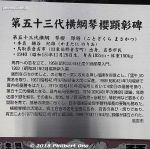
About Yokozuna Kotozakura. 横綱琴櫻
|
|

Monument for Yokozuna Kotozakura. 横綱琴櫻
|
|

Monument for Yokozuna Kotozakura. 横綱琴櫻
|
|

Small museum for Yokozuna Kotozakura. Too bad it was closed when I was there. 横綱琴櫻
|
|

Signs in English.
|
|
|
|
|
|
|
|
|
|
|
|
|
|
|

Benzaiten Hall next to Dairenji Temple. 弁財天堂
|
|

Benten Hall 弁財天堂
|
|

Benzaitendo Hall
|
|
|

To Benten Hall.
|
|

To Dairenji Temple.
|
|

Gate to Dairenji Temple.
|
|

Dairenji Temple.
|
|

Dairenji Temple.
|
|

Dairenji Temple bell.
|
|

Old telephone.
|
|

Ring out the old year with the temple bell.
|
|

Dairenji Temple main hall in Kurayoshi, Tottori. Belongs to the Jodo-shu Buddhist sect. 大蓮寺
|
|

Dairenji Temple main hall in Kurayoshi, Tottori. 大蓮寺
|
|

Dairenji Temple in Kurayoshi, Tottori also has graves of local merchants who made it rich and local samurai. 大蓮寺
|
|

Dairenji Temple in Kurayoshi, Tottori also has graves of local merchants who made it rich and local samurai. 大蓮寺
|
|

Dairenji Temple bell
|
|

Dairenji Temple bell
|
|

Small Buddha
|
|

Dairenji Temple
|
|

Kurayoshi, Tottori manhole.
|
|
|
|
|

Earthquake damage on the plaster.
|
|
|

Komyoji Temple with red roof tiles.
|
|
|
|
|

Condemned.
|
|

JR Kurayoshi Station on the JR San'in Line.
|
|

JR Kurayoshi Station
|
|

JR Kurayoshi Station with Conan train.
|
|

JR Kurayoshi Station with Conan train.
|
|

JR Kurayoshi Station with Conan train.
|
|
|
|

Inside a San'in Line train.
|
|

JR Kurayoshi Station turnstile.
|
|

Inside JR Kurayoshi Station.
|
|

JR Kurayoshi Station turnstile.
|
|

In front of JR Kurayoshi Station.
|
|
|

Police box in front of JR Kurayoshi Station, Tottori.
|
|

Police box in front of JR Kurayoshi Station.
|
|

JR Kurayoshi Station.
|
|

Kokeshi doll at JR Kurayoshi Station.
|
|

JR Kurayoshi Station.
|
|

Going out JR Kurayoshi Station.
|
|

JR Kurayoshi Station exit/entrance
|
|

It was New Year's at JR Kurayoshi Station.
|
|

Statues at JR Kurayoshi Station.
|
|

Statues at JR Kurayoshi Station.
|
|

Gift shop at JR Kurayoshi Station.
|
|

Bus stop at JR Kurayoshi Station. Buses go to Hawai Onsen and the Shirakabe Storehouse district.
|
|

Tottori Prefecture's second most popular hot spring. 25-min. bus ride from JR Kurayoshi Station.
|
|

At the spur of the moment, just decided to hop on the bus and take a casual look at Misasa Onsen. Nothing serious. Maybe next time.
|
|
|
|
|
|
|

The river has a nice outdoor bath.
|
|

The river has a nice outdoor bath for mixed bathing. (Probably no women.) Kawaraburo
|
|

Misasa Onsen's free outdoor bath next to the river. Kawaraburo
|
|
|
|
|
|
|

Song monument for the Misasa Kouta folk song composed by Composed impromptu in 1927 by famous poet and minyo composer Noguchi Ujo (野口雨情) who was visiting the onsen and drinking beer in a ryokan while writing the lyrics.
|
|

This statue shows a famous scene from the "Misasa Kouta" silent movie that was made for the song in 1929.
|
|

Song monument for Misasa Kouta folk song composed in 1927. Inscribed with the song's first two lines. 三朝小唄 歌碑The monument is near the river.
|
|

One of the main streets of Misasa Onsen.
|
|
|
|
|

Hot Plaza tourist facility and bus stop.
|
|

Inside Hot Plaza tourist facility and bus stop.
|
|

Bus back to Kurayoshi Station.
|
|

The Sands of Tottori. Every prefecture has something nationally (and sometimes internationally) famous. In the case of Tottori, it's definitely the sand dunes (sakyu in Japanese).It's on the beach facing the Sea of Japan. The dunes were formed by the ocean currents that deposited the sand on the coast for 100,000 years or so. I find that amazing since most of the beaches I know have the ocean currents eat away the sand.
|
|

The Tottori Sand Dunes is in the city of Tottori, a short bus ride from JR Tottori Station.
|
|

This is what I saw when I arrived at the sand dunes. Sand all over this parking lot across the road from the dunes.
|
|

This man told me that this happens only when there are strong winds. I was relieved to hear that it wasn't every day.
|
|

Although the sand dunes are shrinking, there's still lots of sand here.
|
|

The sand is quite solid, not soft like beach sand on Waikiki.
|
|

Wind-blown footprints.
|
|

Tottori Sand Dunes looked like this when I first visited years ago. The shape does not seem to change.
|
|
|
|

Camel rides even. Seem to be a good business, but they don't go very far.
|
|

The San'in coast has lots of little islands and rocks. This is Japan's No. 1 sand dunes for tourists. Quite white and convenient to get here.
|
|
|

This sandy hill is named "The Horse's Back" because it's similar in shape. It's the most touristy part of the sand dunes.
|
|

When you see the Tottori Sand Dunes, you'll see tiny humans way out in the distance. They look to be far, far away, but the distance is surprisingly close.Maybe only a 10- or 15-min. walk away. Depending on whether you climb the dunes or not.
|
|
|
|
|

Looks steep.
|
|

The sand dunes can be pretty steep, but not dangerous. They have downhill sand boarding.
|
|
|
|
|

Tottori Sand Dunes are very photogenic, and many photographers have used it for artistic shoots.
|
|
|
|
|

From the top of the dune.
|
|
|

The steepest part looks to be around 40˚. There are more gradual slopes that you can easily go up and reach the top.
|
|
|
|

Kids love to climb the slopes.
|
|

Over many years, strong winds blew the ocean sand onto the beach to form the Tottori Sand dunes.
|
|

The first time I visited Tottori was in summer so the sand and sun were too hot to walk across to the ocean. No problem in winter so I finally got to see the ocean beyond the dunes.
|
|
|
|

Very dramatic ocean at Tottori Sand Dunes.
|
|
|
|
|
|
|
|
|
|
|

Bus stop to go back to Tottori Station.
|
|

Entrance to Tottori Sand Dunes
|
|

Across the road from the Tottori sand dunes is The Sand Museum exhibiting incredible giant sand sculptures. The Sand Museum opened in 2012 and it's the world's first and only museum dedicated to sand sculptures.The Sand Museum holds a sand sculpture exhibition from April to early January every year featuring a different country or region outside Japan. In 2017, the theme was the U.S.A.
|
|

The Sand Museum is a short bus ride from JR Tottori Station.
|
|

Sculpture outside the museum entrance.
|
|

Sand Museum entrance.
|
|

Sand Museum entrance.
|
|

Sand Museum entrance had a sculpture of a dog since 2018 was the Year of the Dog.
|
|

Entrance to exhibition area.
|
|

Inside the Sand Museum in Tottori. Giant sand sculptures all representing the USA.
|
|

The exhibition had 19 large and medium-size sculptures showcasing a major aspect of Americana, centering mostly on people.
|
|

The sculptures were created by professional sand sculptors (didn't know there was such an occupation) mostly from overseas.
|
|
|
|

Centerpiece sand sculpture when you enter the Sand Museum.
|
|

This sand sculpture's theme was "Hollywood" in the 1950s-60s. John Wayne, Laurel and Hardy, Lucille Ball (I think). Tottori Sand Museum in 2017.
|
|
|

Closeup of Marilyn Monroe in sand. That's her dress in "The Seven Year Itch." Tottori Sand Museum.
|
|

Closeup of Marilyn Monroe sand sculpure.
|
|

Charlie Chaplin
|
|
|

John Wayne sand sculpture.
|
|

Laurel sand sculpture.
|
|
|
|